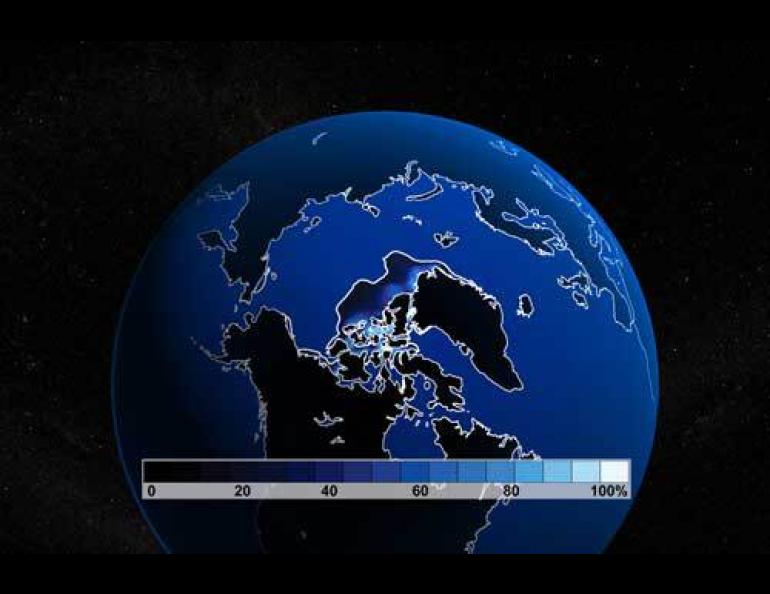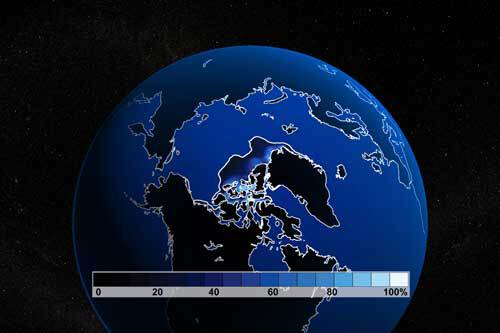
An ice-free Arctic Ocean coming soon?
SAN FRANCISCO—Sea ice coverage on top of the world shrank again in 2006, and experts are predicting that the polar ice cap may disappear in summer soon.
At a Dec. 11, 2006 press conference about northern warming here at the annual American Geophysical Union meeting, Mark Serreze of the National Snow and Ice Data Center at the University of Colorado said that by the end of November 2006, the floating ice pack on top of the world was two million square kilometers smaller than it has been on average during the recent past.
“That’s an Alaska-size chunk of ice missing,” he said. “When we looked at it in November, we were just astounded.”
The low ice year in 2006 followed a slim 2005, when scientists recorded a new record low in northern sea-ice extent. The sea ice that floats on the Arctic Ocean waxes and wanes with the seasons, growing in winter and shrinking in summer. Serreze and other scientists who keep an eye on its size using satellite images say the icepack seems to be shrinking so much in the summer that the cold air of winter can’t make up for the melting.
“The ice is no longer recovering well in autumn,” Serreze said. “And once you thin that ice to a critical point, it’s not going to survive the summer.”
Serreze referred to the Arctic, particularly the large concentration of sea ice floating on the ocean, as “the refrigerator of the northern hemisphere.” When sea ice decreases, more open ocean is exposed. The ocean absorbs heat rather than reflecting it, so the loss of ice means that less new ice will form.
Scientists at the press conference, including Larry Hinzman of the International Arctic Research Center in Fairbanks, talked about a “tipping point,” a threshold beyond which the sea ice might not be able to recover, which would lead to an Arctic Ocean free of ice. At the press conference, Marika Holland of the National Center for Atmospheric Research unveiled results of her latest sea-ice modeling study. It shows that the Arctic Ocean may be ice-free during the summer as early as 2040. The ice cap reaches the tipping point—caused by some natural event like warmer water entering the Arctic—in less than 20 years.
“In the model, the ice is stable until about 2025, and then boom, it goes,” she said.
Some people would welcome an ice-free Arctic Ocean, the scientists said. A northwest passage could make shipping less expensive and more profitable for northern Canada and Alaska ports, but an ice-free Arctic Ocean would also warm North America’s refrigerator, Serreze said.
“There’d be less snow cover in Colorado, for instance, and less snow to cover winter wheat crops,” he said. “Certainly, on balance, the changes would be negative.”
Other scientists in the press conference talked about large amounts of fresh water “stacking up” in the Arctic and how less sea ice changes the type of creatures that thrive in the Arctic Ocean, with bottom-feeders hurting with less ice and pollock and other fish thriving. An ice-free summer would probably doom polar bears, which hunt and rest on ice floes.
The researchers were part of one of the largest gatherings of scientists worldwide. The week-long AGU meeting in San Francisco drew more than 12,000 scientists last year and organizers expected it to be even bigger in 2006. Many of the talks and posters this year are tied to “abrupt” climate change. Serreze, who has tracked the shrinking northern ice pack for years, said now is a good time to pay attention to a warmer world.
“I’m trying not to be an alarmist, but I’ve watched this for a long time, and it concerns me,” he said.






